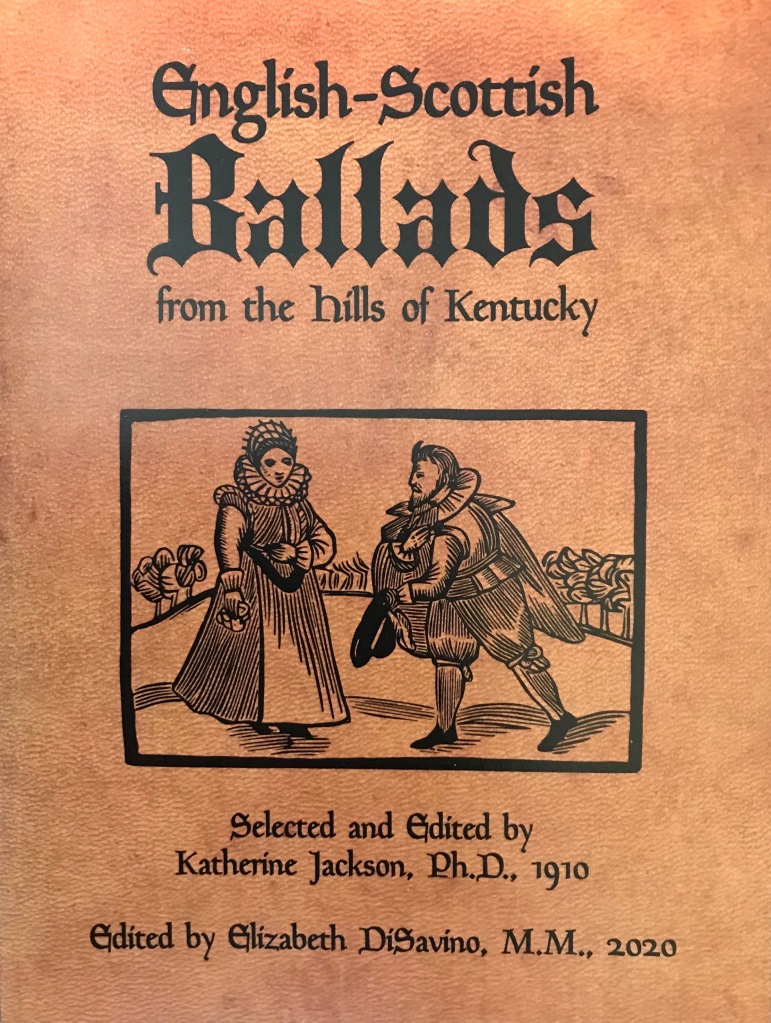Ballads Research Guides
Ballads At Berea College
Ballads are songs that tell a story. As is the case with present day popular music, ballads tell stories of love and loss, murder and violence, heartbreak and betrayal, or heroes and villains.
Earliest folk music scholars such as Francis James Child, Cecil Sharp, and several from Berea, focused on finding and preserving variants of ballads and other songs in Appalachia that had originated in the British Isles. They were motivated by the fact that these songs were fading from memory in their home countries. Some scholars were of a mind that such material was somehow more "authentic" or "American" than popular music with roots in European or African traditions.
Others focused more on the traditional music that originated in America, recognizing the influence of other ethnic groups besides British isle settlers. Among these were African American railroad workers, Germans, French Huguenots, and East Europeans.
Examples of early scholarly attention to non-white Appalachians are James Mooney's Myths of the Cherokee (1901) and Louis Chappell's John Henry: A Folk-Lore Study which uncovered the story of the African-American railroad ballad "John Henry."
Berea Ballad Collectors and Collections
The urge to document the place of these musical traditions in the lives of Berea College students found expression in the efforts of several faculty, students, and alumni during the early 1900s.
James Watt Raine began teaching English at Berea College beginning in 1906. He taught courses on English and Scottish ballads and actively collected ballads from his students and others in the Berea community. His interest in documenting regional culture extended beyond music. His influential book, The Land of the Saddle-Bags (1924) included eyewitness accounts of mountain speech, education, religion, community politics, and farming. Text Examples (Hear the Texts Set To Music: Barbara Allen, Lady of Carlisle, House Carpenter)
John F. Smith taught in the Berea College Normal School. In 1915, as part of his Composition and Rhetoric course, Smith asked students to write down the names of banjo and fiddle songs and tunes known to them in their home districts of eastern Kentucky and Tennessee. The results are a large, varied body of material that includes ballads, songs, fiddle and banjo tunes, and games. His work is described in this detailed article. Text Examples
Talitha Ethel McClure (nee Powell) was a Berea student who worked in the College library. She compiled ballad and other song texts in 1915 for a contest initiated by Berea College President, William G. Frost. McClure received the prize for collecting the most lyrics. Her mother, Talitha Powell (nee Davis), provided ballad texts to British collector, Cecil Sharp, during a visit to Berea in 1917. Text Examples
Leonard Roberts was a Folklorist and a 1939 Berea graduate. He taught English in the Berea Foundation from 1945 to 1950. He made extensive use of sound recording in his collecting of ballads and magic tales from Berea students and many others over several years’ time. Ballads can be heard in his recordings of the Couch family from Harlan County.
Bradley Kincaid graduated from the Berea College Academy (high school) in 1921 at age 26. A deepened interest in music while at Berea led him to begin systematically collecting ballads and songs. His search included several trips throughout eastern Kentucky. The material collected was eventually included in thirteen published songbooks which became important adjuncts to a country music radio singing career. He talks about his life and career in this interview. Text Examples
Additional Ballad Collections and Other Resources
Addie Graham 1890 - 1978) was born at Gilmore in Wolfe County, Kentucky. She was a masterful traditional singer whose repertoire included ballads dating back to the British Isles, others composed in America, frolic songs and ditties, and religious songs in the Primitive Baptist tradition.
Katherine Jackson French was originally from London, Kentucky. This collection comprises the ballads she collected from Kentucky mountain residents, Berea students, and local residents during the period 1909-1910.
Alan Lomax, working for the Library of Congress, recorded a wide swath of eastern Kentucky traditional music in the late 1930s including almost 400 ballads of various types.
Bill Williams: A Kentucky Songster
A profile and archival audio of Bill Williams of Greenup, Kentucky. Bill was a retired railroad worker who performed for all walks of the local society for nearly 50 years. by John H. Bondurant.
Billy Edd Wheeler is a singer-songwriter who graduated from Berea College in 1955. In these recordings he talks about the songs he heard growing up in West Virginia and how they figured in the process of his songwriting.
Hip-Hop musical storytelling has been a presence in Appalachia for several years. In these interviews, four young artists talk about their life and music.
Ferrum College / Blue Ridge Institute and Museum has extensively preserved African American music and musicians primarily in southwest Virginia and the southern Virginia Blue Ridge.
Published Sources
-
English Folk Songs from the Southern Appalachians by
Call Number: Mt. 782.42162 S531en 1966ISBN: 9781935243175 -
Katherine Jackson French by
Call Number: 782.43 E587 2021ISBN: 9780813178523Publication Date: 2020-05-19 -
 English-Scottish Ballads from the Hills of Kentucky
by
Call Number: 782.43 E587 2021ISBN: 9780990608646Publication Date: 2020-01-01
English-Scottish Ballads from the Hills of Kentucky
by
Call Number: 782.43 E587 2021ISBN: 9780990608646Publication Date: 2020-01-01 -
Frankie and Johnny by
Call Number: 398.208 M849f 2017ISBN: 9781477312087Publication Date: 2017-04-18 -
John Henry and His People by
Call Number: Mt. 781.621 H522zg 2022ISBN: 9781476686110Publication Date: 2021-12-28 -
 The Songs and Poetry of Billy Edd Wheeler.
Call Number: Mt. 784.3 W562s
The Songs and Poetry of Billy Edd Wheeler.
Call Number: Mt. 784.3 W562s -
The Child Ballads in Modern Folk and Rock Music by
Call Number: 782.421 T469e 2023ISBN: 9781493068067Publication Date: 2023-07-15 -
 African American Music of Appalachia
Call Number: 781.729 B627 2003 v. 23 no. 1/2
African American Music of Appalachia
Call Number: 781.729 B627 2003 v. 23 no. 1/2

